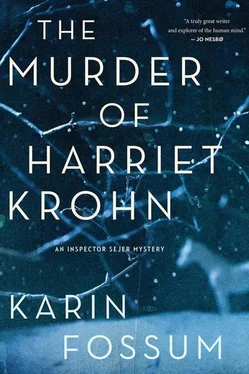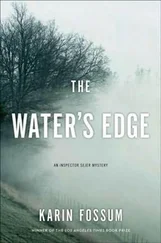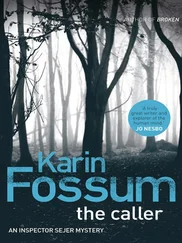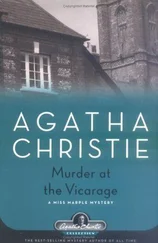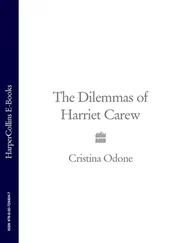“I’ve rode a pony,” Julie says. She’s hopping up and down, her red hair bouncing.
“Ridden a pony?” says Inga Lill, dismayed.
Charlo dives in. “We’ve been to the riding center, and they let her have a go,” he says. “Just a couple of circuits.”
“A couple of circuits? Have you seen the time?”
“I’m learning riding there,” Julie says, “Daddy said I could.” She plumps down on a chair and puts her elbows on the table. Inga Lill pushes them off again. Then she scoops the pieces of fish out of the frying pan and places them on a dish.
“We’ll have to talk about that,” she says. “It’s bound to cost a lot of money.”
Charlo goes over to her and glances at Julie and winks.
“There isn’t much to talk about,” he says, “believe me.”
He gives his wife a meaningful look and nods in the direction of Julie’s red head, rolling his eyes to convey what he’s recently witnessed. But Inga Lill hasn’t witnessed it, and her shoulders are tense with reluctance. She puts the dish on the table and drains the potatoes.
“They have so many accidents,” she murmurs quietly, so that Julie won’t hear.
“You let her cycle by the road,” he says. “That’s worse.”
“But she wears a helmet,” says Inga Lill.
“She does on horseback, too,” he retorts. They look at one another. Julie hangs on her mother’s expression.
“I want to ride,” she says emphatically, staring down at the table and holding her fork ready for the food.
“Wash your hands,” says Charlo. “You’ve been in the stables. Come on, we’ll go to the bathroom.” He helps her get the water the right temperature, and they stand there close together soaping their hands, their eyes meeting in the mirror.
“I want to go again tomorrow,” she says defiantly, rubbing her hands so the lather flies. Charlo dries them with a towel.
“Julie,” he says. “It’s one lesson a week. We can’t afford more than that.”
“I can brush,” she says decidedly and takes the towel from him. “And I can go there and stroke him, and comb his tail and things. I can give him bread and carrots.”
They return to Inga Lill, who’s sitting ready at the table.
“You need so much equipment for riding,” she says anxiously. “Boots, helmet, high-visibility vest, things like that.”
“She can borrow all she needs,” Charlo responds, “and she can ride in the boots she’s got. They’ve got decent heels. She can borrow a helmet, too. Maybe we’ll have to buy a riding whip, which costs about thirty kroner. Yes, and then a pair of good gloves. That’s all.”
Inga Lill falls silent and starts eating. Julie keeps her under observation and keeps peeking in Charlo’s direction. Things are moving too slowly for her. But Charlo is playing the long game, because he knows Inga Lill. He knows that she needs time.
“Julie mustn’t suffer because of your anxiety,” he says between mouthfuls. “Supposing she wanted to do Alpine skiing. Lots of injuries there. Supposing she wanted to do handball — that’s really rough. Supposing she decides one day that she wants to start diving.”
Inga Lill sends him a sideways look. “Well, I suppose, if she just rides in a circle and doesn’t start jumping. If she doesn’t ride out in traffic, but stays indoors and only rides when there’s a teacher there. That’s probably not so risky.”
Charlo bites his lip. “Of course she must start jumping; that’s what makes it fun. But they begin with a pole on the ground. They start from the bottom.”
“I won’t come,” she says. “I won’t sit there watching, because my nerves won’t stand it.”
Charlo smiles. “But mine will,” he says. “Your daughter’s tough, Inga Lill. She’s got plenty of guts. She must be allowed to go her own way. Ballet’s never going to be her thing.” He catches himself as he says it. “Dancing is actually the toughest thing you can choose; it’s a constant battle with pain. I’m glad you’re not going to be a ballet dancer, Julie,” he says, laughing.
She giggles over her fish, reveling in this father who’s organizing everything for her.
“But she’ll have to join the Riders’ Club. It’s obligatory, to do with insurance and all that.”
Inga Lill sighs heavily.
“You should be pleased,” says Charlo, “ that you’ve got a daughter who wants to do something. Just look at what the other girls get up to when they’re older. Hanging around in the evenings outside the service station looking for boys. It’s better for her to be in the stables; at least she’ll be doing something meaningful.”
Eventually she manages a valiant smile and surrenders. Julie wolfs down large quantities of food, already preparing for her new future as a rider.
“You’ll have to shovel horse manure,” Charlo cautions her, “and it’s very hard work.”
She nods eagerly, looking forward to shoveling horse manure, looking forward to the whole rest of her life, now that it’s just beginning. He smiles gratefully at Inga Lill. She looks tired. She was ill even then, but none of them knew it.
The hours in the stable are what bring him and Julie so close together. They share everything, the joy and the drudgery, the laughter and the tears. They set off in the evenings in all sorts of weather: the heat of summer, the storms of autumn, and the frosts of winter. On the coldest days, the harness is so stiff that it’s almost impossible to bend the straps. But Julie keeps warm. After three circuits of the ring, she throws off her jacket. She grows and starts jumping, and the jumps gradually get higher. Charlo’s heart races each time she flies over. He feels a mixture of fear and triumph. Sixty centimeters, a meter, one meter twenty. Goodbye to Snowball the pony, and on to a big horse, a gelding called Mephisto. It’s serious now. The passion never cools. It fills the days and nights. And always those green eyes on his, insistent.
“I want my own horse.”
“We can’t afford it, Julie.”
“Then I’ll save for it myself,” she says. “I’ll get a job.”
He nods his encouragement, thinking it’s good she’s got dreams and he knows she’s got willpower.
“And maybe I’ll get some money for my confirmation. I can use that.”
“Yes,” he says. “We’ll manage it.”
She clutches his jacket and holds him fast.
“Is that a promise, Dad?”
He looks at her and nods. “Yes, it’s a promise.”
The memory of it makes him shudder. She saved twenty thousand kroner, and he gambled the money away behind her back. Another memory returns. He’s in the shop with Julie; Inga Lill has sent him out to get some groceries. On the way, he stops at a slot machine. He rummages in his pocket and finds a ten-kroner bit and sticks it into the slot. Julie watches him skeptically, seeing the symbols spinning in the windows. Some coins clatter into the dish. Hearing the noise, people turn and look at them.
“Fun, isn’t it?” he says and smiles, pushing in another ten-kroner bit. The machine begins its whirring. Charlo is full of childish pleasure. More coins clatter into the dish.
“Mom isn’t very happy about all this,” Julie says, with doubt in her voice. “Every time you see one of these machines you’ve got to feed it.”
“It goes to a good cause,” he says, inserting another coin. “And anyway, I do win sometimes.”
“Can’t we go home? I’m hungry.”
“Ready soon. I’ve got a bit of money left.”
She gives a sigh of resignation and puts her hands on her hips. She’s the best girl in the world, but she can get bad tempered. He plays with all the money he’s won, shrugs his shoulders, and follows her out. It’s this he’s remembering now. That he turns his back on the machine and leaves, but he can still feel it tugging at him, as if there’s a cord fixed to his back. He wants to return and stand there in the light and play until it’s night. There’s a yearning within him, a hunger. In front of the machine, the world shrinks. It narrows to a tunnel. It’s just him and the coins, the sounds and the lights. He forgets that Inga Lill is sick and, when the money rattles out, it’s as if a torrent is coursing through him.
Читать дальше
